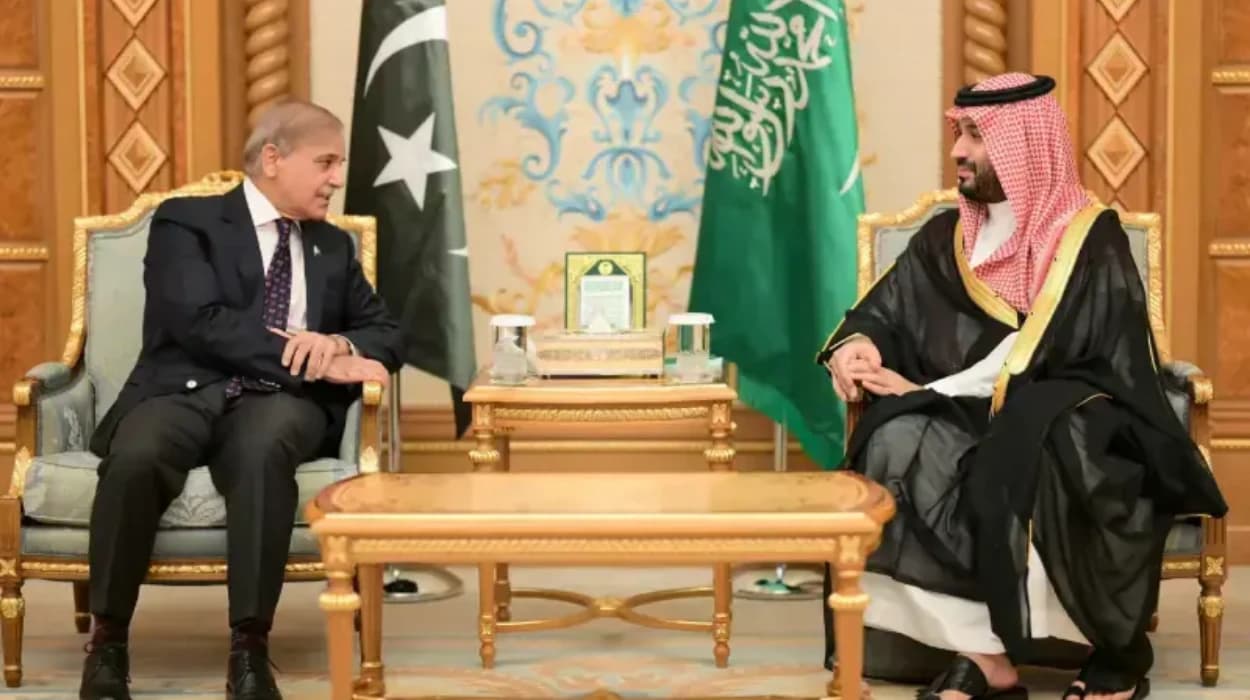Saudi Arabia and Pakistan have launched a comprehensive Economic Cooperation
Framework aimed at strengthening bilateral trade, investment, and development
through strategic projects in multiple sectors, including energy, industry,
mining, IT, tourism, agriculture, and food security. This agreement, endorsed
by Saudi Crown Prince Mohammed bin Salman and Pakistan’s Prime Minister Shehbaz
Sharif, marks a new chapter in the historic brotherly relations between the two
nations.
Saudi Arabia and Pakistan Launch Economic Cooperation Framework
Saudi Crown Prince Mohammed bin Salman and Pakistan Prime
Minister Shehbaz Sharif agreed to launch a wide-ranging Economic Cooperation
Framework during a meeting in Riyadh on 27 October 2025, coinciding with the
ninth Future Investment Initiative (FII) Conference. According to the Saudi Press Agency (SPA), this framework is built on
the foundation of the two countries' shared economic interests and mutual aim
to enhance trade and investment relations.
Prime Minister Shehbaz Sharif posted on X that
“We discussed ways to further expand this historic partnership in trade, investment and economic co-operation,”
while expressing gratitude for the Crown Prince’s
“personal commitment and resolute support in advancing our shared vision for deeper collaboration and prosperity for our two nations and peoples.”
Strategic Projects and Priority Sectors Outlined
The Economic Cooperation Framework ushers in discussions on
multiple “strategic and high-impact” projects in diverse fields such as
economic development, trade, investment, and infrastructure. The focus is particularly on those
sectors deemed pivotal both for the economic growth and stability of Saudi
Arabia and Pakistan: energy, industry, mining, information technology, tourism,
agriculture, and food security.
The cooperation includes plans for an electricity
interconnection project between the two countries. Memoranda of Understanding
(MoUs) are also under study to promote further collaboration in the energy
sector, aiming toward regional energy integration.
Longstanding Brotherhood and Mutual Trust Underpinning the Deal
As reported by Islamabad Post, the framework
"builds on nearly eight decades of historic brotherhood, anchored in Islamic solidarity and mutual trust."
Both leaders highlighted their commitment to intensify
the role of public and private sectors in fostering joint ventures and boosting
bilateral trade exchanges.
Saudi Crown Prince Mohammed bin Salman and Prime Minister
Shehbaz Sharif reaffirmed their shared vision of a sustainable economic partnership
that serves their countries’ leadership aspirations and the well-being of their
peoples.
Broader Context: The Strategic Defense Pact and Economic Support
This economic framework comes shortly after the landmark
signing of a defense pact between Saudi Arabia and Pakistan in September 2025,
pledging mutual defense against aggression, thereby further cementing the
alliance on security grounds. The defense
agreement also supports economic security by assuring protection and confidence
for Saudi investors and stakeholders operating in Pakistan.
Saudi Arabia has historically played a crucial role in
supporting Pakistan’s economy through financial aid, investment memoranda, and
energy supply agreements. Most recently, Saudi investments and loans totaling
billions of dollars have helped stabilise Pakistan’s foreign exchange reserves
and advance vital energy infrastructure projects such as upgrading refineries
and fostering energy sector cooperation.
Statements from Leadership and Future Outlook
Prime Minister Shehbaz Sharif emphasized the forward-looking nature of the partnership, stating,
“This framework is based on the two countries’ shared economic interests and reaffirms their mutual desire to strengthen trade and investment relations to serve their common interests.”
Saudi Crown Prince Mohammed bin Salman and Shehbaz Sharif also expressed anticipation for the Saudi-Pakistani Supreme Coordination Council’s upcoming session, which will formalize mechanisms to institutionalize cooperation and ensure smooth implementing of joint projects under the new economic agreement.
The new framework represents a substantial leap in Saudi-Pakistan relations, expanding the existing partnership from mainly financial and military cooperation into a broader, strategic economic collaboration. This development promises to bolster private sector engagement, diversify economic activities, and enhance regional integration, particularly in energy.
Both nations stand to benefit from strengthened trade ties, increased investment flows, and coordinated efforts on food security and technological development, making this framework a cornerstone for future bilateral collaboration.
